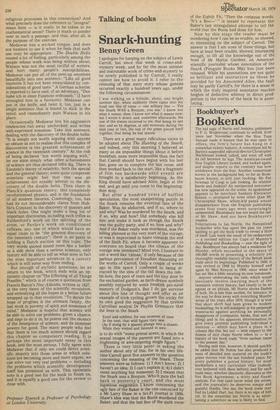Talking of books
Snark-hunting
Benny Green
I apologise for harping on the subject of Lewis Carroll, but since this week is crime-andmystery week, and by far the most sinister and inscrutable work of crime-and-mystery to be newly published is by Carroll, I really cannot see how to avoid it. I refer to the reissuing of that sorry story whose genesis occurred exactly a hundred years ago, under the following circumstances:
I was walking on a hillside, alone, one bright summer day, when suddenly there came into my head one line of verse — one solitary line — 'For the Snark WAS a Boojum, you see.' I knew not what it meant, then: I know not what it means now; but I wrote it down: and, sometime afterwards, the rest of the stanza occurred to me, that being its last line: and so by degrees, at odd moments during the next year or two, the rest of the poem pieced itself together, that being its last stanza.
There are a great many ridiculous views to be adopted about The Hunting of the Snark, and indeed, only this morning I believed as many as six impossible things about it before breakfast, none more impossible than the fact that Carroll should have begun with his last line, gone on to complete the last verse, and then worked back to the start, like a fragment of film run backwards until events are brought to a satisfactory beginning. As the King should have advised Alice, begin at the end, and go until you come to the beginning: then stop.
But after a hundred years of baffled speculation, the most exasperating puzzle in the Snark remains the eventual fate of the Baker. Was he abducted, and if so, where to and why? Was he murdered by the Snark, and if so, why and how? Did somebody else kill him and make it look as though the Snark was the guilty party, and if so, how and why? And if the Baker really was murdered, was the killing planned at the very start of the voyage, or was it improvised in haste towards the end of the Sixth Fit, when it became apparent to everyone on board that the climax of the voyage was imminent? Mind you, I hesitate to use a word like 'climax,' if only because of the parlous prevalence of Freudian theorising on the works of Carroll. Only a couple of weeks ago in this space I confessed to being attracted by the idea of the fall down the rabbit-hole, the pool of tears and the tiny door to the enchanted garden, as birth-dream symbols possibly conjured by some freakish pre-natal memory of Dodgson's. But I do get nervous about this line of thought and offer as an example of trick cycling grown tbo tricky for its own good the suggestion by that tireless Carrollian analyst Dr Phyllis Greenacre that the lines in the Snark
Erect and sublime, for one moment of time. In the next, that wild figure they saw (As if stung by a spasm) plunge into a chasm, While they waited and listened in awe.
is to do with "some primal scene, in which the sexual images of the parents are fused into a frightening or awe-inspiring single figure."
There is very little point in asking the author about any of this, for in his own lifetime Carroll gave five answers to the question concerning the meaning of the Snark. These answers were as follows: 1) I don't know; 2) I haven't an idea; 3)! can't explain it; 4) I didn't mean anything but nonsense; 5)! meant that the Snark was a Boojum. Which puts the ball back in posterity's court, and the most ingenious suggestion I know concerning the ugly fate of the Baker is the one concocted by a Mr Larry Shaw in a Sci-Fi journal in 1956.. Shaw's idea was that the Boots murdered the Baker, and that the last line of the sixth verse '
of the Eighth Fit, "Then the ominous words, It's a Boo—' " is meant to represent the Baker's last strangulated attempt to tell the world that the Boots had done for him.
Now by this stage the reader must be wondering how I can be so erudite, so shrewd, so interesting on the subject of Carroll. The answer is that I am none of these things, but have at least been erudite, shrewd, interesting enough, to lift all the knowledge out of the head of Mr Martin Gardner, an American scientific journalist whose annotation of the Snark (Penguin Books 50p) has just been reissued. While his annotations are not quite so brilliant and instructive as those he provided for his Annotated Alice, the fault may be partly Carroll's, for there is a sense in which the truly inspired annotator reaches heights of deductive whimsy in direct prodportion to the merits of the book he is annotating.


































 Previous page
Previous page